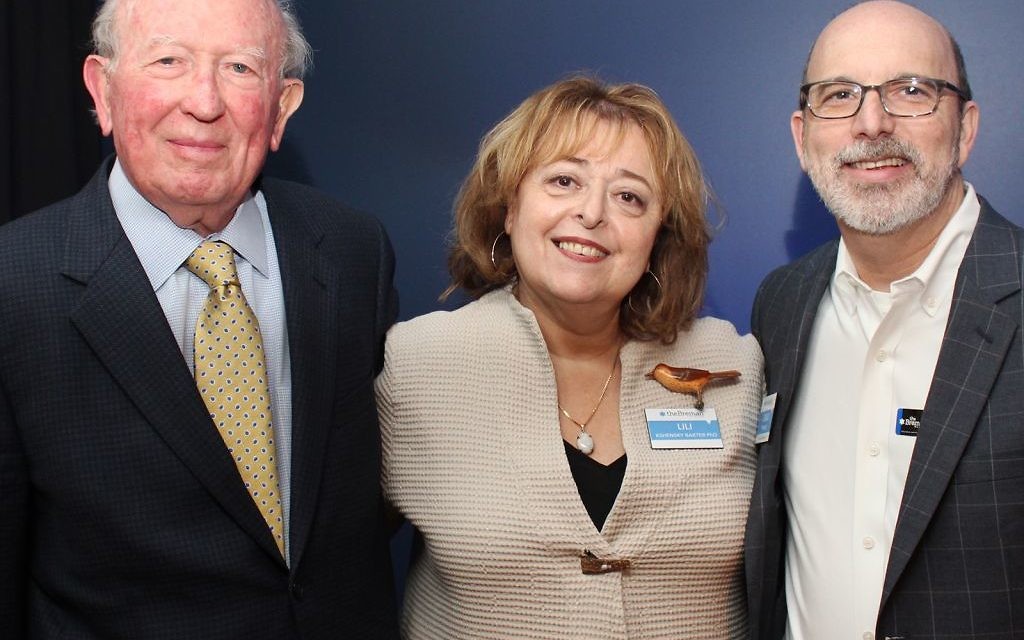Baxter Safeguarded Survivors’ Legacy
Four words that capture Jews’ bravery against the Nazis: resourcefulness, resistance, rescue and resilience.

Liliane Kshensky Baxter devoted the past 13 years to preserving Holocaust survivors’ stories at the Breman Museum’s Weinberg Center for Holocaust Education, a legacy she has passed to Rabbi Joseph Prass after retiring in March.
Her emphasis was on the Holocaust’s Jewish perspective. After repeatedly hearing “Why didn’t the Jews do anything?” she focused on four words that capture Jews’ bravery against the Nazis: resourcefulness, resistance, rescue and resilience.
Baxter’s family history reveals why her position was important to her.
Get The AJT Newsletter by email and never miss our top stories Free Sign Up
Born to Holocaust survivors from Poland in a displaced persons camp in Sweden, Baxter immigrated to New York from Paris when she was 9. Yiddish was often spoken at home.
Her upbringing, combined with her passion for Judaism and social justice, led her to enroll in the Jewish Teachers’ Seminary to study Yiddish, and she received a bachelor’s in English from Hunter College.
After moving to Atlanta to obtain her doctorate, Baxter volunteered at the Martin Luther King Center until she was offered a job by Coretta Scott King as the director of nonviolence studies and research.
“It was a wonderful opportunity, and I really enjoyed working there,” Baxter said.
She worked with students on leadership development and created an internship for scholars who sought to promote civil equality. “It was about making a difference in the realm of social activism and nonviolence while keeping in tradition with tikkun olam. I felt the center and the civil rights era mimicked those who were committed to nonviolence after seeing the horrors of World War II.”
While studying at Emory, Baxter enrolled in the Candler School of Theology, where she pursued a degree in human development, and took courses in women’s studies. “I was interested in moral development and how to become a better mensch. I wanted to discover what gives people the most meaning in life and promote it within them,” Baxter said. “I was particularly fascinated with heroic individuals such as Gandhi and Dr. King, who were willing and able to extend themselves to help others.”
Working at the Breman since 2004, Baxter helped educate children and adults about the Holocaust through survivors’ stories.
“We focused a great deal of our attention based off the Survivors Speakers Bureau and wanted to help survivors share their stories in a clear, effective and engaging manner, which now includes visual presentations through technology, partnerships with the survivors and docents,” Baxter said.
She helped launch Bearing Witness, a Breman series in which a survivor speaks after a brief documentary portraying that individual story. “I thought to myself, ‘How can we preserve survivors’ stories, especially since we are beginning to lose speakers?’ ”
After consulting with colleagues at Yad Vashem, Baxter appreciated the value of film for connecting survivors to audiences.
“The videos followed by the Q&As became an influential aspect of teaching. When audience members get to see a hero, they become more attentive and inevitably learn more,” Baxter said.
The project moved ahead with the support of past President Norman Zoler, funding from the Halpern family and a film committee created with the help of Judy Cohen.
Bearing Witness programs now routinely fill the auditorium at the Selig Center. Thanks to donations by the Sara Giles Moore Foundation, people can attend the sessions and get museum admission those days at no charge.
“When visitors are asked how many are Jewish, only about half raise their hand. This is a good indication that we need to continue teaching and relay survivors’ stories,” Baxter said.
In retirement, she looks forward to time with her three children and seven grandchildren, and she will teach “Yiddish Through Song” at the Marcus Jewish Community Center’s Lisa Brill Institute in January.
Baxter said she was fortunate to work with the Breman. “Listening to survivors’ stories makes you realize how quickly hate can seep into a community and a nation. The survivors have a responsibility to share their story with the world; it is our responsibility to listen. The Holocaust’s narrative touches on the extremes of life in terms of love, hate, brutality, life and death, which compose the panorama of human behavior. It’s also a continuation of what matters most in life, such as family, one’s identity, foundation and need for relationships.”




comments